The predominately African-Guyanese village of Lovely Lass, West Coast Berbice, seemed quiet during a midday visit with most of the residents busy trying to get chores done.
The village, located about 54 miles from Georgetown and about 12 miles from the Berbice Bridge, is bordered by Onverwagt to the west and Golden Grove to the east.
At one end of the village carpenters were constructing a house. One of the men stopped his work to pose for a photo when he saw this reporter with the camera. Although the residents were very receptive, many of them were too shy to have their pictures taken or to even speak to this newspaper.
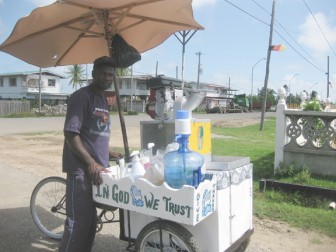
Most of the residents are engaged in self-employed activities such as rice, cash crop and livestock farming. Some operate businesses like grocery shops, rum shops, a disco and snackettes. A woman also operates a fruit and vegetable stall by the roadside. The Porter family is known for being involved in large-scale rice farming. At the time of this
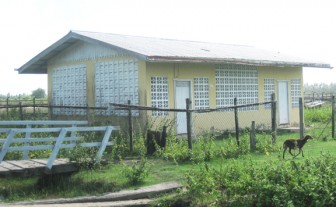
newspaper’s visit they were going to their rice field on a tractor/trailer. A few of the residents are employed at places like the nearby schools as teachers, and at the Fort Wellington Hospital.
Children attend a nursery school located in the village, which also has a Community-Based Rehabilitation Centre building and a playground that the youths use for cricket, football and other sports.
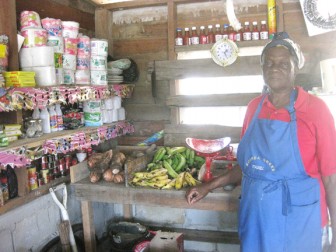
Winston Ramdeo, a resident of the nearby Bush Lot Village operates the Lovely Lass Service Station. Next to the gas station, a sign, ‘Rhythm of Life Recording Studios‘ caught my eye. The studio offers a service for those seeking to create music tracks, record vocals, produce CDs, and transfer music from LP records and cassettes to CD. The business belongs to
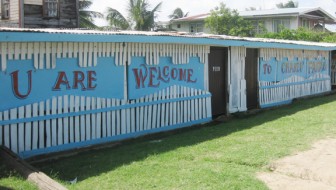
Junior Richmond, a trained saxophonist, who is hired to perform at weddings and other similar functions.
He once operated a workshop but closed it for health reasons, and had to look for other ways to earn a living. He always wanted to get into the music business but was sceptical at first about the feasibility of that.
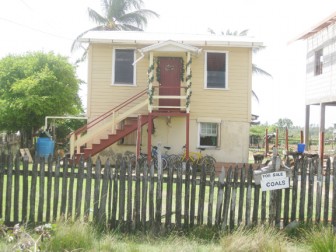
Richmond explained that he creates music for persons who have the melody, then processes it and burns it on CDs. This month he will launch the Tina Insanally Music Foundation (TIMF), an organization based in Georgetown that makes music training available primarily to less fortunate children. He has been involved with TIMF for more than a year and it will be expanding to West Berbice. He said he already has a
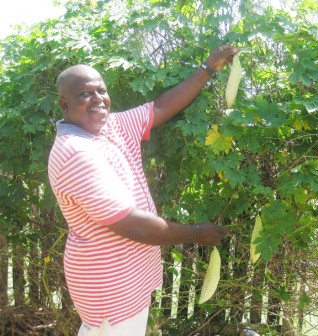
“core group of kids to start with. They would be given vocals and learn to play musical instruments.”
He noted that “generally it would be a very good thing happening to us in West Berbice because our kids, other than going to school and church, have nothing else to do… We are looking at something as another avenue for positive expression.”
He was involved in a church band and started playing musical instruments from a young age while living in Linden. “Through the years I have played with a number of secular bands [like the]
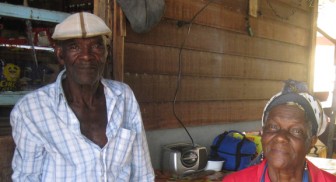
Mischievous Guys and Yuruba Singers.” He lamented that even music is not a viable business because there is no copyright law to prevent pirating. Many talented singers, he noted, “get frustrated and give up on it.”
Housewife Ingrid McAlmont occupies her time by engaging in a little business
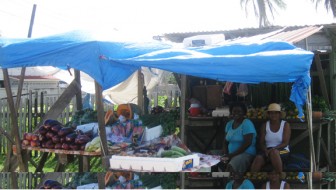
at home to sell coals and turkeys. She was busy cooking a pot of stewed bora to finish in time for when her husband, Frank McAlmont, a welder/fabricator got home from work.
She rears the turkeys and would sell a lot – at $400 per pound – around the holiday season.

But this time all she had left in her pen were the “breeding stocks” as she lost most of the young ones during the rain.
Her husband purchases the coals from the Linden Highway. Residents would use them mostly for bar-b-ques and can purchase a bag for $1,200 or “half bag” for $600. A few of the residents would also use the coals for cooking and baking, and Ingrid explained that just to meet their needs she would sell by the pound for $50.
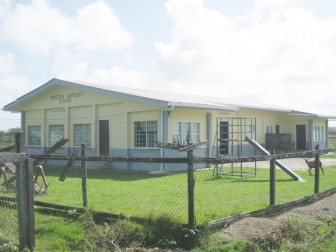
She moved to the village from Lichfield over 10 years ago and enjoys living there, pointing out that the “people are loving and co-operative.”
Frank returned him from his workshop for lunch as I was leaving. He learnt his trade as a welder from the New Amsterdam Technical Institute and started working with Guymine‘s Linden operation. He then secured a job with the Dutch firm, Ballast Nedam at Onverwagt before opening his workshop in 2006.
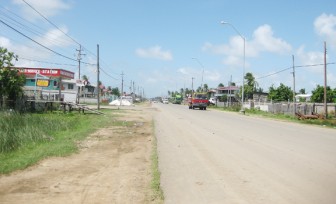
McAlmont who said that “welding is my life,” deals with mostly agricultural machinery and is engaged in “regular work” up to when the rice crop is on. Some his work includes repairing and fabricating chippers and cage wheels. He would also make iron grills, fences and gates.
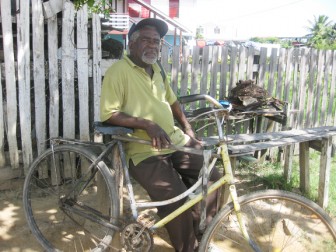
This newspaper caught up with Cyril Solomon, 63, who is employed as a guard at the Onverwagt Aquaculture Farm, as he was riding to the shop on his bicycle. He told this newspaper that since working there he “got to learn a lot; I did not know anything about fish.” He also served at the MMA as a senior clerk. Also a retired special constable, he lived in the village for several years after moving from Beterverwagting on the East
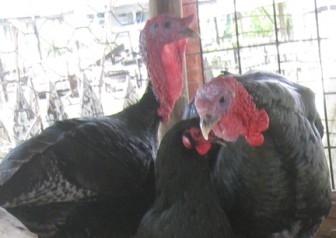
Coast. He too enjoys living there and describes the village as quiet and the residents as friendly and helpful.
In another section of the village, Wayne Bob, 64, was resting on a bench under a tree in the hot midday sun. He was on his way on his bicycle to the Gecom office at Fort Wellington where he works as a security guard. He works three shifts and prefers to use his bicycle, not just because of the exercise but
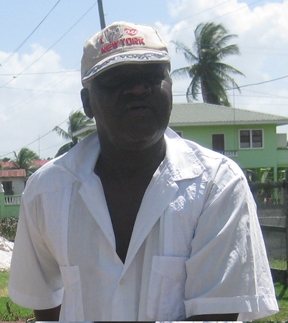
because he saves $200 per day. “With the little money I earn not much would left if I have to pay to travel to work,” he lamented.
Nearby, pensioner Lambert Woodroffe called ‘Uncle Lam’ was awaiting customers at his snackette which also stocks other items like vegetables, provisions and groceries. He called out to his wife, Rosey Woodroffe, fondly known by villagers as ‘Aunty Winnie,’ to speak to this newspaper. She was busy in the kitchen pressuring channa for lunch.
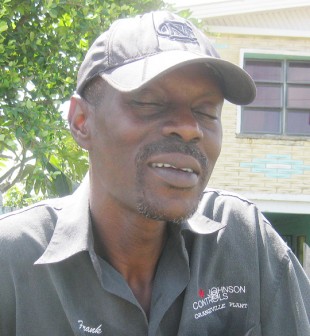
She is also popular for the salted fish and dried shrimp which she sells, and said proudly that she would even get orders from “overseas” at times. She is very keen on processing the items to a high standard so that persons would always keep coming back for more. The woman explained that she would parch the shrimp well and then dry it in the sun. She would then remove the shells and would give them to her son to feed his pigs.
Rosey who loves to keep herself occupied also makes pepperpot and bread to sell on Fridays. She and her husband also earn an income from the coconut and other fruit trees in their yard.
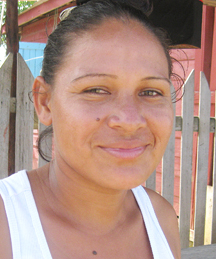
She was born and grew up at Golden Grove and moved to Lovely Lass when she got married. She started to operate a small shop and then extended it. Working hard is nothing new to her because her parents owned and operated a fishing boat. She used to “walk and sell” fish and also learnt the art of making the processed fish and shrimp from them.
Jermaine Fraser was pushing his sno-cone cart along the street as he headed home. He had finished selling for the day. A painter by profession, he started the business three months ago to provide for his wife and five children. He noted too that he does not “sit down and depend on anyone,” and reared sheep and pigs as well. “If you want to make it in life you have to work “round the clock; you can’t sit down and blame the government,” he advised.
He does not engage in “rum-drinking. At least you have to keep focus. The boys who want to wear their pants low [to waists] and walk on the road would find themselves in trouble.”
Further up the road, Sherry Williams provides a small service to weave hair extensions. She also does hairstyles mostly on weekends for weddings and other occasions and for schoolchildren.
Originally from Ituni in the Berbice River, she moved to the village 10 years ago. She was involved in a cricket team in that area and went for matches at places like Ogle, East Coast Demerara and Old England in Linden.
Her husband, Devon Benjamin, a rice farmer, told this newspaper that he has been renting his rice land for about three weeks now, although he would have preferred to farm it himself.
He suffered a major setback though, when he lost his last crop simply because the combine operator abandoned his field to harvest someone else’s rice. He promised to return to finish his job but “he pushed me around for three weeks.” By then the rice could not be saved and he was sad that he had to watch helplessly as all the money that he invested and his hard labour “go down the drain.”
He said he has to “catch my hands again before I could go back and plant again.” To add to his distress, he visited the representative of the Rice Producers’ Association at Bush Lot to uplift a voucher for seed paddy and fertilizer but did not get any.
Despite his misfortune, Benjamin said, “I always say God don’t give people more than they can bear.” In the meantime, he is “trying something different to make ends meet and would do mason work or go in the gold bush to work; I have my family to take care of.”





